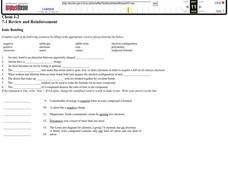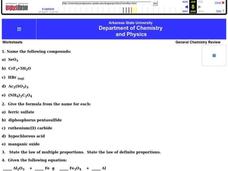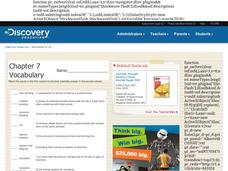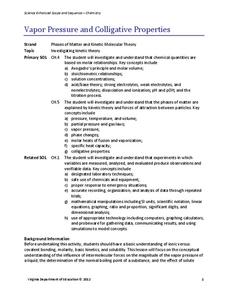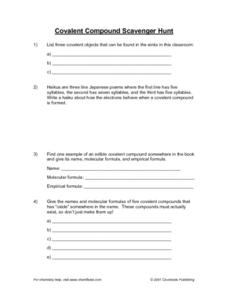Curated OER
Tie Dye
Students practice writing research proposals to test the color fastness of a dye once it has been exposed to a t-shirt. Each proposal needs details of experimental design, length of treatment, and means of cleaning the shirt. All...
Curated OER
Ionic Bonding
In this ionic bonding worksheet, students review the characteristics of ionic bonding, draw Lewis dot diagrams for elements, and write the chemical formula for ionic compounds. This worksheet has 8 drawings, 14 fill in the blank, and 6...
Curated OER
Chemical Compounds
In this chemical compounds learning exercise, students write the name of compounds from their chemical formula, balance equations, write electronic configurations for elements, and draw Lewis dot structures. This learning exercise has 8...
Curated OER
Polymers
Students explore online tutorial on polymers. In this chemistry lesson, they create two polymers in the lab and compare their properties. They write a sales letter about their new and improved polymer product.
Curated OER
Chapter 7 Vocabulary
In this online vocabulary activity, students match 14 definitions to the correct vocabulary term. Students may click the solution button to check answers.
Curated OER
The Nature of Salt
High schoolers record information from the periodic table for sodium and chloride. They determine whether salts are molecular or ionic compounds, along with sodium chloride's molecular weight, and relative weights
Curated OER
Unit 4 - Periodic Table
There are 17 multiple choice questions on this periodic table test. The focus is on properties of the elements by group and period. The exam is not formatted well, making it a little difficult to read. There is also a typographical...
Virginia Department of Education
Vapor Pressure and Colligative Properties
Hate to vacuum, but enjoy using a vacuum pump? Explore a lesson plan that starts with a demonstration of boiling water at various temperatures by using a vacuum pump. Then scholars design their own experiments to measure vapor pressure...
Curated OER
Gumdrop Crystal Models
A great way to learn about molecular structures is to make a model. Gumdrops and toothpicks are used to construct crystal models. The models are based on theories of crystal shapes that occur because of positive and or negatively charged...
Normal Community High School
Mole Calculations
You didn't know you'd find moles in chemistry class! Through the introduction of moles and molar volume at STP, classes see how to calculate moles using a given chemical equation. The presentation includes a short review of ions in...
Curated OER
Chemical Formulas Unit-Day 4
The purpose of this lesson plan involves reviewing nomenclature and molecular
formulas as well as introducing naming molecular compounds and identifying acids. The students investigate and understand how conservation of energy
and matter...
Curated OER
Review for Chemistry
In this review for chemistry learning exercise, students decide if given statements are true or false. Students relate information learned about introductory knowledge gained in chemistry to accurately answer the given questions.
Curated OER
Covalent Compound Scavenger Hunt
In this chemistry worksheet, students look for the covalent compounds while examining the objects in the classroom. They also apply the knowledge of formulas.
Royal Society of Chemistry
Tests for Anions
The anode, the positive electrode, attracts negative charges, which is why we call negatively charged atoms anions. The interactive allows pupils to match six different anions to the associated properties when testing. Offering four...
Curated OER
Empirical Formulas
In this empirical formulas worksheet, students read about determining empirical formulas from chemical formulas. They determine the empirical formula given ten molecular formulas. They also find the molecular formulas given the mass and...
Curated OER
The Speed of Chemistry
In this rates of chemical reactions worksheet, students read about the various factors that influence the rate of chemical reactions such as surface area, concentration, temperature and catalysts. Students answer eight questions about...
Curated OER
Review Sheet for Covalent Compound Quiz
In this covalent compounds worksheet, students name 6 compounds given their chemical formulas, they write the formulas for 6 compounds given their chemical names and they answer questions about boiling points and solubility. They write...
Curated OER
The Basics of Biochemistry
Science teachers can introduce basic chemical concepts to biology students.
Curated OER
Properties of Matter
Students investigate the properties of matter. In this properties of matter lesson, students observe containers of different metals and discuss their properties including density. Students find the density of an unknown metal and of...
Curated OER
Naming: Putting it all Together
In this naming compounds worksheet, learners are given a flow chart guiding them to name chemical compounds. They are given several different compounds to name including binary covalent and binary ionic compounds.
Royal Society of Chemistry
Some A-level Reagents
Learning names and formulas can be a daunting task for young chemists, so support their study with interactive puzzles! First, users match each formula with its correct name. Then, individuals use them to complete three logic games.
Curated OER
Oil Embargo!
Ninth graders generate and analyze data to determine which and how much of two polymers best absorb oils, formulate procedure to accurately determine how many times its own weight particular polymer can absorb, and develop understanding...
Curated OER
Molecular Models
In this molecular formula worksheet students fill in a table describing elements and chemical formulas. They identify, elements by type and how they bond. The student analyze molecular formulas to identify the number of atoms and if the...
Curated OER
Differentiate Elements, Compounds, and Mixtures
Students examine the differences between elements, compounds and mixtures. Using diagrams, they compare and contrast atoms and molecules and describe various chemical reactions. They distinguish the differences between ionic and...



